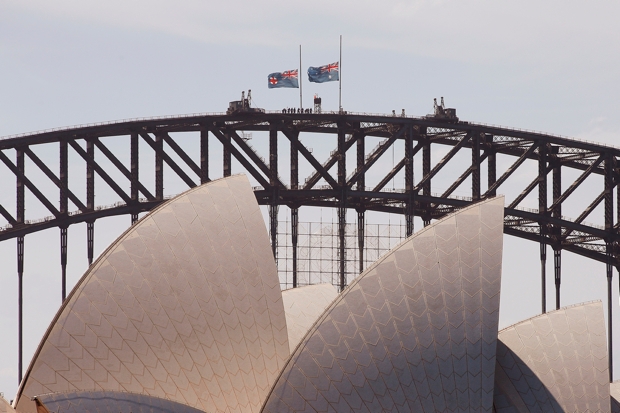It was a scene that Australians are hitherto unfamiliar with. Terrified civilians forced at gunpoint to press a black flag, bearing the shahādah – the Islamic declaration of faith, most notably used as a battle banner by Jabhat al-Nusra, al Qaeda’s franchise in Syria – against the Lindt café window. The gunman, aside from a chat with Australian Prime Minister Tony Abbott, requested a proper Islamic State flag, which, in fairness, would be hard to come by in Sydney these days.
The perpetrator, Man Haron Monis, was well known to authorities. Facing more than 40 sexual and indecent assault charges, he had a conviction for sending offensive letters to families of deceased Australian soldiers, describing a dead Australian soldier as ‘the dirty body of a pig’.
Australia has finally felt the maiden ripples of the long war against Islamist terrorism on its own shores. This battle, as David Martin Jones and MLR Smith argue, is not against an abstraction, but a ‘distinctly modern ideological phenomenon’, and the most dangerous form lies within the major cities of the West, in London, Paris, Madrid, New York, and Sydney.
The fourth edition of the English-language publication of IS, Daqib, promulgated the ideal that ‘attacks take place in … the US, UK, France, Australia, and Germany… the citizens of crusader nations should be targeted wherever they can be found’. It would appear that Monis was responding to that call, given his oath of allegiance to the IS Khilafah published on his website.
Predictably, a few hours after the siege was brought to its bloody conclusion, Australia’s commentariat seem more concerned with arguing over the appropriateness of labelling the attack as ‘terrorism’, mitigating – as Mark Steyn would dryly observe – the natural disposition of Australians towards pogroms against their Muslim neighbours, or waxing lyrical on Monis’s mental instability, as if jihadism is normally the pursuit of the most mentally healthy chaps around.
Australia, it should be said, is no stranger to jihadist plots. Australia’s relatively small and underdeveloped jihadist community became self-starting, rather than externally directed, with the foiling of two jihadist cells in Sydney and Melbourne in 2005, in what came to be known as Operation Pendennis. Authorities for many years seemed to be continually one step ahead of plotters, foiling numerous cells, and plots, including in September of this year. The events in Sydney have brought this fortunate series of events to a close.
As then-director of the Australian Security Intelligence Organisation (ASIO), David Irvine, said in August, ‘a recurring nightmare has been the so-called lone wolf, radicalised over the internet, who had managed to avoid coming across our radar’. The evolution of jihadist practice concerning the idea of lone wolves is lifted from Aryan Nation strategist Louis Beam, who first articulated the potential effectiveness of adaptable, leaderless resistance, with seemingly random actors committing acts of violence, as the attacks in Woolwich, Ottawa, Boston, and Nairobi, Brussells, and now, Sydney, have demonstrated. This was co-opted into jihadist strategy by Abu Musab al-Suri, who theorised ‘individual terrorism jihad’, or ‘individualized terrorism’.
The ‘Londonistan’ phenomenon – the granting of high degrees of latitude and tolerance to various key Islamists ideologues and strategists – has relevance to Australia.
Take Musa Cerantonio. As I wrote in the Australian arm of the Spectator earlier this year, the International Centre for the Study of Radicalisation identifies him as one of the two most prominent spiritual authorities that foreign fighters in Syria look to for inspiration and guidance. Cerantonio remains free to waltz around Melbourne.
Or take the case of Abu Sulayman, who implored his Australian followers to join the jihad in Syria, and occupies a senior position on Jabhat al-Nusra’s General Islamic Council. He recently helped the group capture the Syrian city of Al-Sheikh Maskin. Both also preached out of the same infamous (and now defunct) Al-Risalah bookshop in Sydney.
Indeed, Australia’s traditionally minute jihadist community is set to grow by some degrees in the coming years. The war in Syria has seen the historically unprecedented number of Australians travel to the Levant to act as cannon fodder for jihadist organisations. Around 20 Australians have already returned, and around 70 remain in Iraq and Syria. Others are arriving and dying at the same rate, which I suppose is a small comfort.
All in all, despite grandiose front pages, and talk of ‘Death Cult CBD Attacks’ I expect Australians will deal with this atrocity in much the same way as our British cousins. Much of the ‘no connection to Islam’ rhetoric will be the same, with a certain degree of resilience and stiff-upper lip. The more prescient question, however, relates to what will unfold in the months ahead.
Joseph Power is Editor-in-Chief of The Transnational Review and sits on the Executive Council at the Australian Institute of International Affairs, Queensland






Comments